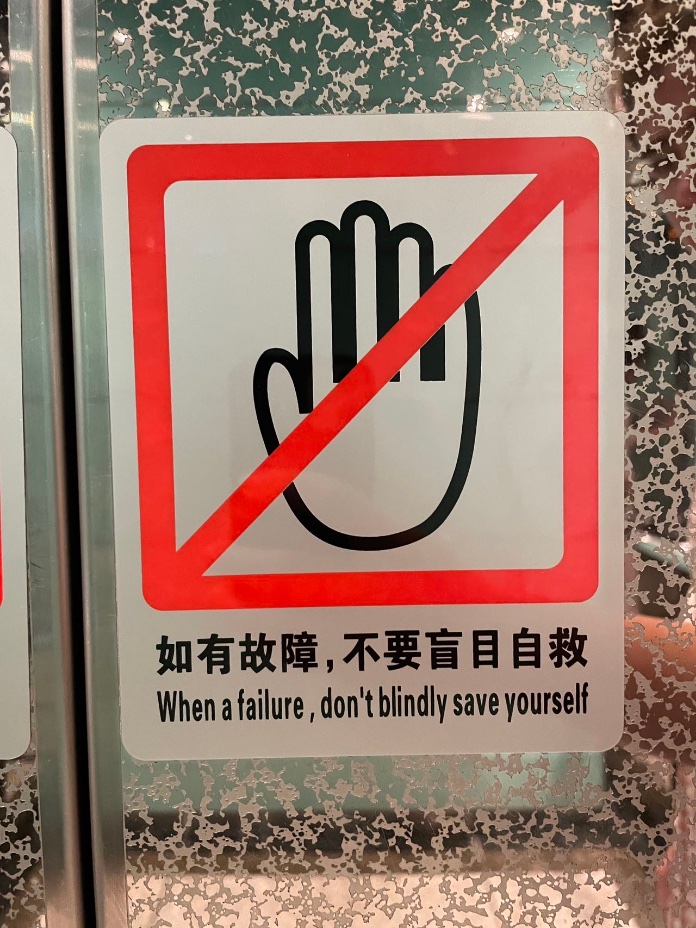"Don't blindly save yourself"
« previous post | next post »
The following photo is from Guanghzhou and was taken recently by David Lobina's partner who’s there now.
The Chinese says:
rúyǒu gùzhàng , búyào mángmù zìjiù
如有故障,不要盲目自救
"If there is a malfunction, do not blindly rescue / save yourself"
Though the second clause may initially strike one as being in error, it is actually a correct translation of the Chinese. It's the first clause that's problematic. The sign looks like it's on the door of an elevator / lift, and gùzhàng 故障 means ("malfunction; out-of-order", so it's pretty clear what they're trying to tell you. Don't do something foolish or risky to circumvent the mechanism (force the door open, escape through the opening in the ceiling, etc.). Wait till someone (staff, mechanic, engineer, fireman, etc.) who will come to rescue you.
Selected readings
- "'Please wait patiently for the failure of the system'" (5/14/22)
- "Xi Jinping: 'when a car breaks down…'n" (11/13/14)

David Chop said,
August 9, 2023 @ 1:03 am
The graphic isn't particularly helpful either.
Halting forbidden? Stop stopping?
AntC said,
August 9, 2023 @ 1:05 am
Wait till someone (staff, mechanic, engineer, fireman, etc.) who will come to rescue you.
Seems to be the important message — along with 'Don't Panic'. Most lifts have an emergency call button, or a phone. (Even if the button does no more than sound an alarm/isn't connected to any rescue services, that would at least mean trapped people wouldn't be so tempted to 'blindly' poke in the mechanism.)
DeepL is giving me 'If there's a malfunction, don't try to save yourself.' Which I think would only increase my level of panic. Even with the 'blindly', isn't there a more direct way to suggest what you should actively do; rather than waiting passively for … what, exactly?
Or am I being all too gweilo about it?
Taylor, Philip said,
August 9, 2023 @ 3:58 am
Interesting. Until I read Victor's explanation, I interpreted "do not blindly rescue / save yourself" as "try to save others before trying to save yourself" — i.e., the opposite of the standard airline injunction to put on one's own oxygen mask before trying to help one's asphyxiating infant, an injunction which I imagine most mothers would totally ignore …
Victor Mair said,
August 9, 2023 @ 5:41 am
@David Chop
I pondered the same problem. What does it mean to forbid the hand?
In the end, the best I could come up with is that they are trying to tell you not to stick your hand in the door when it is closing (but that's not a malfunction). Or maybe they're trying to tell you not to force the door open with your hand under any circumstances, including a malfunction (e.g., the door is not opening when it should).
Don't stick your hand in the door. Don't force the elevator door, no matter what!
I must confess that I'm one of those people who sometimes stick their hand in the elevator door when it is closing. I know I shouldn't do that, but when I'm in a hurry to get to class….
unekdoud said,
August 9, 2023 @ 7:03 am
Don't rest your hand on the closed door, lest unspeakable things happen when the door opens!
Even with different text, the underlying message is still the same: don't touch, or else.
Adam said,
August 9, 2023 @ 8:33 am
@David Chop
“Don’t stop . . .”
Pamela said,
August 9, 2023 @ 9:18 am
The terseness transit warnings produces some of the highest poetry in the universe. I like "Yield"–some of us know it means "yield to oncoming traffic" but what do the rest of us think it means? My first thought for this one is "In the event the car stops, do not try to escape." but that would only work if the sign is hung inside the car (can't tell from the photo). If it is hung outside the doors, I would assume it means something like "If you have missed your car don't try to force your way in." In any case it seems to mean: "You are undertaking to ride the elevator. Your fate is no longer in your own hands."
Daniel Barkalow said,
August 9, 2023 @ 11:49 am
Does the Chinese word have a greater applicability to unsuccessful rescues than the English "save"? I think "do not engage in an amateur rescue operation" would capture the intent in English better than "do not blindly save yourself", which sounds like it's okay to try to get out safely, so long as you don't manage it.
Victor Mair said,
August 9, 2023 @ 2:17 pm
Taking into account all the good reasoning expressed in the above comments, I now am convinced that the sign is inside the elevator doors and that it is telling people not to force them open if the car gets stuck (malfunctions). "Stop!" "Keep your hands out!"
@Daniel Barkalow
jiù 救 means precisely "save"
Jonathan Smith said,
August 9, 2023 @ 11:09 pm
@Daniel Barkalow
The issue is the combination zìjiù (and more generally zì + verb), where the interpretation involves an "adverbial" component "verb by oneself / without aid" — "do not save yourself" misses this where your rendering captures it. Compare e.g. Eng. "self-medicate" or the like where the implication is often "do without proper supervision to deleterious effect." Here "do not blindly self-extricate" would kind of capture what is going on…
Victor Mair said,
August 10, 2023 @ 6:13 am
Speaking of "blindly":
"Blindly busy" (8/26/18)